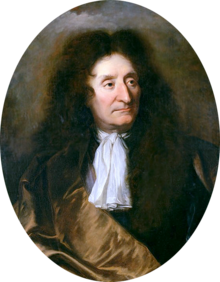Analysis of The Cobbler
La Fontaine 1621 (Château-Thierry, Champagne) – 1695 (Neuilly-sur-Seine, Île-de-France)
WE'RE told, that once a cobbler, BLASE by name;
A wife had got, whose charms so high in fame;
But as it happened, that their cash was spent,
The honest couple to a neighbour went,
A corn-factor by trade, not overwise
To whom they stated facts without disguise;
And begged, with falt'ring voice denoting care,
That he, of wheat, would half a measure spare,
Upon their note, which readily he gave,
And all advantages desired to wave.
THE time for payment came; the money used;
The cash our factor would not be refused;
Of writs he talked, attorneys, and distress;
The reason:--heav'n can tell, and you may guess;
In short, 'twas clear our gay gallant desired,
To cheer the wife, whose beauty all admired.
SAID he, what anxiously I wish to get,
You've plenty stored, and never wanted yet;
You surely know my meaning?--Yes, she cried;
I'll turn it in my mind, and we'll decide
How best to act. Away she quickly flew,
And Blase informed, what Ninny had in view.
Zounds! said the cobbler, we must see, my dear,
To hook this little sum:--the way is clear;
No risk I'm confident; for prithee run
And tell him I've a journey just begun;
That he may hither come and have his will;
But 'ere he touch thy lips, demand the bill;
He'll not refuse the boon I'm very sure;
Meantime, myself I'll hide and all secure.
The note obtained, cough loudly, strong, and clear;
Twice let it be, that I may plainly hear;
Then forth I'll sally from my lurking place,
And, spite of folly's frowns, prevent disgrace.
THE, plot succeeded as the pair desired;
The cobbler laughed, and ALL his scheme admired:
A purse-proud cit thereon observed and swore;
'Twere better to have coughed when all was o'er;
Then you, all three, would have enjoyed your wish,
And been in future all as mute as fish.
OH! sir, replied the cobbler's wife at ease,
Do you suppose that use can hope to please,
And like your ladies full of sense appear?
(For two were seated with his wedded dear
Perhaps my lady 'd act as you describe,
But ev'ry one such prudence don't imbibe..
| Scheme | AABBCCDDEE FFCCGG HHIIJJKKLLMMNNKXCC GG XXOO CCKKPP |
|---|---|
| Poetic Form | |
| Metre | 1111010111 0111111101 1111011111 010101011 01101111 1111010101 011110101 1111110101 0111110011 01010001011 0111010101 01101011101 1111010001 0101110111 011110110010 11011101010 1111001111 1101010101 1101110111 111011011 1111011101 0101110101 1101011111 1111010111 111100111 0111010101 1111010111 1111110101 1101011101 11110101 0101110101 1111111101 1111011101 011110101 01010101010 01010111010 0111010101 11011111110 1111110111 0101011111 1101010111 1101111111 0111011101 1101011101 01110111101 111110101 |
| Closest metre | Iambic pentameter |
| Characters | 1,987 |
| Words | 370 |
| Sentences | 13 |
| Stanzas | 6 |
| Stanza Lengths | 10, 6, 18, 2, 4, 6 |
| Lines Amount | 46 |
| Letters per line (avg) | 33 |
| Words per line (avg) | 8 |
| Letters per stanza (avg) | 257 |
| Words per stanza (avg) | 61 |
Font size:
Submitted on May 13, 2011
Modified on March 05, 2023
- 1:56 min read
- 63 Views
Citation
Use the citation below to add this poem analysis to your bibliography:
Style:MLAChicagoAPA
"The Cobbler" Poetry.com. STANDS4 LLC, 2024. Web. 28 Apr. 2024. <https://www.poetry.com/poem-analysis/25343/the-cobbler>.


Discuss this La Fontaine poem analysis with the community:
Report Comment
We're doing our best to make sure our content is useful, accurate and safe.
If by any chance you spot an inappropriate comment while navigating through our website please use this form to let us know, and we'll take care of it shortly.
Attachment
You need to be logged in to favorite.
Log In